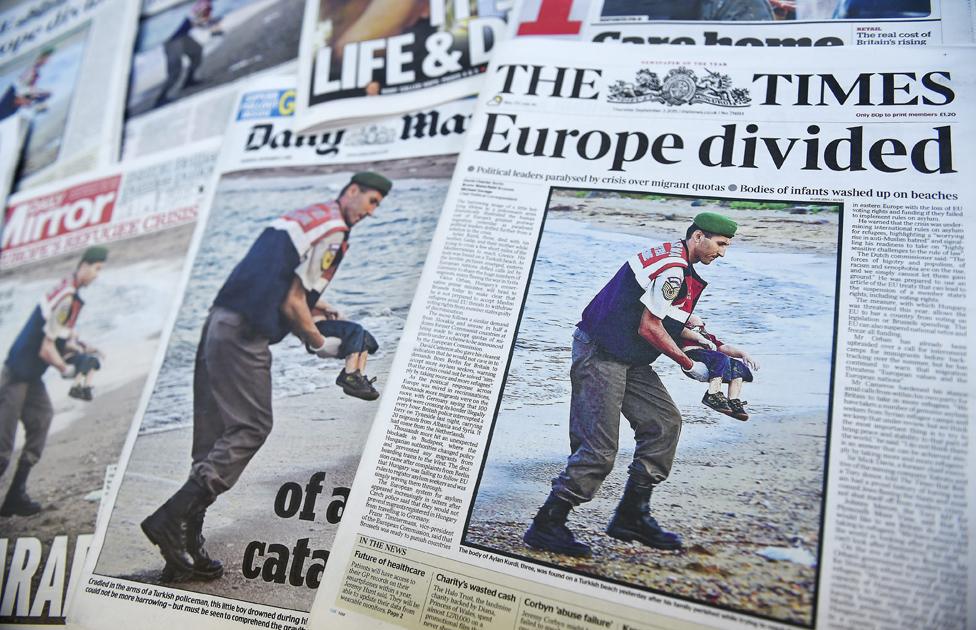Have we changed our mind about asylum?
- Published
- comments

Our conscience has been pricked, our hearts have been softened. The tragic image of little Alan Kurdi lying dead on Europe's shoreline has, we are told, awakened Britain's generous nature.
But I'm afraid I don't believe it. I just don't think public opinion shifts like that.
We were either more welcoming of refugees than suggested before the shocking photograph from a Bodrum beach last week, or we remain profoundly sceptical of the motives of many asylum seekers, and nervous of what might follow if we open our doors now.
I suspect it is the latter. And so, it would seem, does the prime minister.
When the British public was asked to describe an immigrant in a survey for the Migration Observatory a few years ago, 62% of people identified an asylum seeker - even though they account for just 4% of total immigration.
The reason is that asylum seekers represent the most visible, and most emotionally troubling, aspect of immigration. Men jumping on the back of lorries to smuggle themselves into the UK and claim asylum is what immigration looks like on the TV. Students, who make up half of all non-EU immigrants, arrive quietly and almost unseen.
So in the public's mind, one of the smallest groups of immigrants is thought of as one of the biggest. And in a political climate where immigration is the number one concern of voters, it would be a major surprise if people wanted thousands more.
Indeed, the 2011 Migration Observatory survey suggested most people (56%) thought Britain should reduce the number of asylum seekers it allows in. To provide some context, just under a third of people (32%) wanted to reduce the number of foreign skilled workers coming to the UK.
A BBC Newsnight/ComRes poll published on Monday finds that 57% of people don't think the UK should accept any more asylum seekers from countries like Syria and Libya. Almost a third of people think we take too many as it is.
The real problem here is that Britain's immigration debate rarely differentiates between different kinds of migrant.

The politics is around total numbers and a net migration figure that lumps together Australian brides, Chinese students, Brazilian astrophysicists, Russian billionaires, Nigerian nurses, Indian doctors, French professional footballers, Filipino care-workers… and Syrian refugees.
The picture of little Alan was powerful not just because it was a dead child washed up onto a holiday beach. It stopped our breath because it was someone who looked nothing like our mental image of an immigrant.
We have been taught to think of swarming migrants threatening our borders and our way of life. This small boy, in his red T-shirt and with tiny shoes lying face down in the waves, was the very opposite.
It would be easy to rail against a simplistic and unsophisticated immigration debate. But, actually, the simplistic approach is to imagine that one can easily categorise those foreign citizens who wish to live in the United Kingdom. A student is not necessarily planning to study forever. A worker can lose their job. A marriage may be for convenience rather than love.
Motivations are hard to unravel. Those fleeing persecution, for instance, may also be desperate for a better life in the West: a better job, education or healthcare. Even they might not be able to work out how much of the decision to leave their homeland is down to fear and how much to hope.
Last year, after appeals, just over half of those applying for asylum in the UK were granted refugee status. But this is an administrative system trying to be objective in a very subjective environment.
The Nigerian mother who claims asylum along with her little girls because she fears the children will be victims of female genital-mutilation may have an accurate or inaccurate view of the risk. The review panel may have a different assessment. There are no easy answers.

And it is no surprise, therefore, that the British public are highly sceptical about the motivations of some of those who come to claim asylum. Most people think there are too many immigrants coming in and we don't trust them.
UK attitudes tend to be a lot tougher towards immigrants than other comparable nations. An international survey conducted by Transatlantic Trends in 2010 (I reported on it here) found that around a quarter of Brits don't think any migrant should be allowed to access the NHS (25%) or state schools (22%), even if they are here legally. In other European countries with significant immigrant populations, the figure ranges from 1% to 5%.
The focus of the recent political and media debate has led many people in Britain to conclude that the country is being taken for a ride, that we are a "soft touch" and being exploited by foreigners. That is no less true of those who have trekked across continents from war zones.
The appalling picture of Alan may have pricked our conscience, but I doubt it has changed our mind.